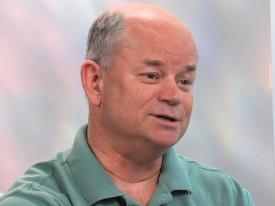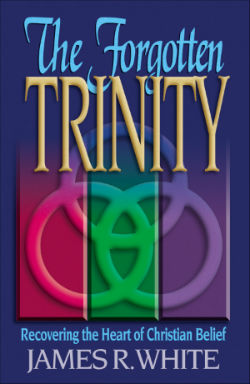The Vicarious Ministry of Jesus…And What It Means
By Neil Earle
For some five years our church, Grace Communion
International, has been stressing the importance of the Trinitarian
relationship inside the Godhead and what it means for our salvation.

Mike Feazell, Trinity defender and expositor
The technical term for this teaching is
“Trinitarian-Incarnational theology,” a challenging
concept, perhaps, that nevertheless explains the decisive and cosmic
event that happened when the Word became flesh. In summary it means…
- As God the Son, Jesus has
eternally existed in perfect communion with the Father and the Holy
Spirit (John 1:1; 14:7-11). This means that
the key term that explains what God is all about is not power or sin
or guilt but…relationship.
“Out of this Triune relationship comes
everything,” said Dr. Mike Feazell at a GCI Conference in
Ontario, CA on February 25. ”God is not ticked off about sin
and out to get us but is instead calling us to focus on sharing that
love relationship between the Father and the Son.”
God is not the Great Rule Maker in the sky; he is the
Father of Jesus. It is Jesus, says Saint Paul, who has made us
accepted in the heavenly realm (Ephesians 1:6). Through Jesus’
work in the power of the Spirit we are adopted into God’s
Triune relationship, the centerpiece of all that is (Ephesians 1:6).
For wayward, erring human beings this is great news: Someone already
loves them before they were born and even if everyone else rejects
them God is still there. The sin issue is very important but a subset
of the far greater reality that God is love (1 John 4:4).
Martin Luther on ‘You Died’
(Colossians 3:3)
This excerpt from Luther’s teaching is printed in
Scottish theologian Thomas Torrance’s 1996 work, Kingdom
and Church: A Study in the Theology of the Reformation. Luther
powerfully holds together the two planes of our salvation – the
earthly and the heavenly – with Jesus the Mediator.
Luther writes:
“A Christian is a person who is buried
with Christ in his death, he has died to sin, the law and death.
..But we do not see that, for it is hidden from the world; it does
not appear, does not strike us in the eye (1 Peter 3:4; 1 John 3:8).
“For the Christian is
not in this world. He does not live, he is dead. He stands in another
life, the heavenly, which is far beyond what we have here.
And what troubles and work and what plagues we shall have to
experience before we reach there…
“But the Christian lives here as there through God’s
imputation, righteous and holy, under the wings which like a hen he
spreads over us. And yet so far as the Christian is a fighter and is
engaged on military service, he is still under the law here and under
sin, for he is still in this life. Daily he feels and experiences the
struggle with his flesh and lives only too close to it (Romans 7:23,
25)…
“A man who believes in Christ is through divine
imputation righteous and holy; he already lives in heaven for he is
surrounded with the heaven of mercy. But here while we are embraced
in the Father’s arms, clothed with the best robe, our feet
stick out from below the mantle, and Stan tries to bite them off if
he can. Then the child whimpers and cries and feels that it still has
flesh and blood, and the devil is still there…Thus we are holy
and free in the Spirit and not in the flesh…You must pull your
feet under your cloak else you will have no peace.”

Martin Luther
- Through the Son becoming like us (Incarnation) he
has lifted our humanity into the divine life of the Godhead
(Colossians 3:3; Hebrews 2: 10-19). “We
have been taken by the Holy Spirit to share what’s going on in
heaven which is shown in Revelation 4 and 5 as the perpetual worship
of the Father and the Son in the power of the Spirit,” Mike
Feazell added. As shocking as that sounds it has been in the Bible
all along: “And God raised us up with Christ and seated us
with him in the heavenly realms in Christ Jesus” (Ephesians
2:6).
(Read box at right to see how Martin Luther expanded on this
glorious good news.)
- Jesus was and remains fully human but is also fully
God and thus our Mediating High Priest who ministers between God and
humankind. 1 Timothy 2:5 shows that the
Mediator between God and humanity is “the
man Jesus Christ.” Revelation 5 adds
to this unusual and little-understood teaching by showing us in
symbol that Jesus appears before the throne in heaven as a “Lamb
looking as if it had been slain” (Revelation 5: 6). The
expositor Leon Morris explains John’s phraseology here: “But
he does not think of the Lamb as slain. The Lamb is
as though slain for he is very much alive.
The Greek perfect tense here signifies that the Lamb was not only
slain at a point of time, but that the [effectiveness] of his death
is still present in power” (Tyndale
Commentary: Revelation, page 95).
Hebrews 9:25 teaches that the divine Son “ever
lives to make intercession for us.” That is Jesus in his High
Priestly role. “We’re created for good relations with
God,” Mike Feazell adds. “God has brought us into his own
self. All humanity has been taken into Christ and we are meant to
live out Christ’s command to love one another.”

A new look at the Trinity tied to Jesus' incarnation is surfacing these days.
That is another practical application of
Trinitarian-Incarnational theology – we see people through new
eyes. C.S. Lewis said we never meet ordinary people, only potential
sons of God unaware of their high purpose.
- The God-Man, Jesus the Christ, has effected the
reconciliation of all things and all humanity to the Father.
Romans 5:18 shows Paul expounding on the superiority of Jesus, the
New Adam, over the First Adam: “Consequently, just as the
result of one trespass was condemnation for all men (what is called
“the Fall”) so also the result of one act of
righteousness was that justification that
brings life to all men.” Colossians
1:15-20 reinforces this as does 1 Corinthians 15:21-22 – “For
as in Adam all die, so in Christ all will be
made alive.”
This is the basis of our
forgiveness and our hope, reports Mike Feazell. “The human race
has hope because God’s love is expressed and based on what he
has done in Christ.” As the hymn puts it:
“Full atonement can it be/Hallelujah what a
Savior”
When Christian ministers lead in their preaching with
God’s love and what he has done for us, then this is a much
more hopeful and effective form of evangelism, of reaching out to the
world.
- And now a little understood principle: When
Jesus died he symbolically took the whole human race down with him
in his death (2 Corinthians 5:14) but when resurrected he took us up
with him, vicariously, to the Father, into the divine life of the
Trinity (Romans 6:11; Ephesians 2:6). This
fully explains what Saint Paul means when he says we are accepted in
the Beloved Son (Ephesians 1:5-6).
The cosmic nature of our salvation clarifies the
vicarious ministry of Jesus. He effected “so great a salvation”
through his death, burial and resurrection by the power of the Spirit
(Romans 1:4). Jesus’ sacrificing activity unites the Father,
Son and Holy Spirit in our salvation. He is our representative in
heaven just as a Congressman vicariously represents all his
constituents. Thus Paul can state in Colossians 3:1-3, “Since
then you have been raised with Christ set your hearts on the things
above, where Christ sits, on the right hand of God…for
you died and your life is now hidden with Christ in God.”
This is the vicarious [in our stead] ministry of Jesus
Christ, perfect God and perfect man, representing us in heaven,
showing that the human race does not need to worry about “getting
in God’s good graces.” As Thomas Torrance puts it, they
are already in God’s good graces
through the salvation flowing from God’s three-fold nature. It
is the church’s job to place humanity’s acceptance into
this Trinitarian mystery near the heart of its message as opposed to
a gospel that begins with
sin and God’s wrath. This is why we baptize in the name of the
Father, the Son and the Holy Spirit (Matthew 2:19-20).
How great are His ways and his counsels far above ours!
 Mike Feazell, Trinity defender and expositor
Mike Feazell, Trinity defender and expositor Mike Feazell, Trinity defender and expositor
Mike Feazell, Trinity defender and expositor Martin Luther
Martin Luther A new look at the Trinity tied to Jesus' incarnation is surfacing these days.
A new look at the Trinity tied to Jesus' incarnation is surfacing these days.